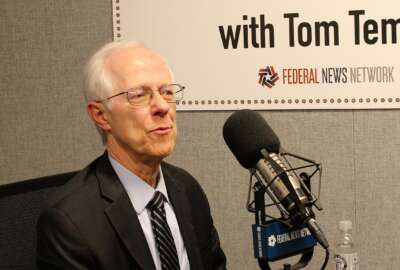For contractors, the next few months are all about numbers.
It is that most magical time of the year. Appropriations arriving six months late for the current fiscal year and Congress futzing over next year's budget.
It is that most magical time of the year. Appropriations arriving six months late for the current fiscal year and Congress futzing over next year’s budget, which will also arrive late. For an expert’s take on what contractors need to do, the Federal Drive with Tom Temin spoke with federal sales and marketing consultant Larry Allen.
Interview Transcript:
Tom Temin And this is becoming routine. But how come it somehow doesn’t feel routine or correct?
Larry Allen Tom, I think one of the reasons it doesn’t feel routine this year because we were so late in 2023, 2024, getting the numbers for the fiscal year 2024 that, it feels like we didn’t get any rest. And that’s right. We didn’t get any rest. We went from 2024 straight into 2025. So, we’ve already got congressional go hating top level spending numbers. We’ve got, you know, House and Senate posturing that could change ironically, in both chambers after the November elections. We have people, who were saying that if you want to increase defense spending, that’s fine, but we need to really enforce parity with civilian agency spending. And of course, that’s not going to go over well with all lawmakers. So, it’s this kind of, I wouldn’t say it’s act one, but it’s, you know, act two of the FY 25 circus and it’s time to pay attention.
Tom Temin So contractors really have no recourse other than to follow the lead in terms of the solicitations and calls for task orders that they’re getting from government customers.
Larry Allen Well, I think there are a couple of things that contractors should do right now, Tom, in preparing for next fiscal year, and that is this week and last week, we’ve seen a steady drumbeat of administration officials making their way up to Capitol Hill to talk about their FY 25 wish lists, and contractors ought to pay attention to what’s on those wish lists, because those have a way of making themselves known during the business season for next year. So, you know, you starting to track those opportunities that are coming down the pike. The other role for contractors? Well, while agencies are beating a steady path to the hill, there’s no reason why contractors can’t. While, House might have some restrictions on earmarks, the Senate, at least for right now, does not. And whether you’re talking about an earmark or just trying to make sure that your program gets funded beyond this year, you know, it’s important to for your elected officials to understand just what jobs are at stake in their states and districts.
Tom Temin Yes, because the usual processes of, I guess you would call it meta normality are the staff. The senior agency staff are going to Capitol Hill to talk about their programs, and the congressional staff is generally listening and taking notes and so forth. So, they’re going through the motions.
Larry Allen They are going through the motions. I think, of course, the big question mark is the November election, Tom, you know, will either party be able to flip the party, the chamber that’s held by the other one right now? When we have both parties in control of one chamber, we just don’t know. But you can certainly put a hypothesis out there that says if one chamber does flip, or ironically, if they both do flip party control, then I think, there will be a lot of pressure to kick final FY 25 spending decisions to the next Congress. That doesn’t convene until January.
Tom Temin We’re speaking with Larry Allen, president of Allen Federal Business Partners. Yeah. So right next January in that election and things tend to get draggy during election years anyway on terms of federal contracting. And I wanted to ask you about your take on the small business numbers. On the surface, it looks like, wow, government has no problem meeting the small business mandate in terms of percentage of contracts and dollars awarded, but that doesn’t really tell the full story of the market, though. Does it.
Larry Allen Tom, it really doesn’t. While it’s great news that the federal government or yet another year exceeded its 23% small business prime contracting goal, and not by a little bit. I think you really need to look beyond the numbers if you expect to be able to meet those goals moving forward. And what I mean by that is there’s increased specialization in the federal market. If you look at numbers, the numbers recently put out by Bloomberg government, they talk about the total small business contractor base dropping by about a third over the last ten fiscal years. A third that’s 33,000 businesses that have net outflows, small businesses. So, when you’re trying to bring in companies that, are new to the market who have innovative technology, you’re really not doing that. You’re rewarding companies that have the specialized infrastructure put in place that they need to comply with all the government rules and regulations. And for all of the talk about, people running innovative and new businesses, you know, the some of the business meetings I’ve been in, frankly, particularly at DoD, if they don’t know who you are, they can be very, reluctant to do business with you because you’re not tested. You’re not proven. So, I think while we made good progress this year, there are definitely some storm clouds on the federal small business contract horizon.
Tom Temin And one of the things that doesn’t seem to be measured or monitored is, you know, DoD and a lot of agencies run these challenge competitions to get so-called innovative ideas about this or that. It could be a technology; it could be some business process that the agency has talent management. And yet I wonder how many of the people that get those challenge grants and prizes, which are small change, basically ever translate into full-fledged government contracting?
Larry Allen Right. And, you know, they’re they we actually have a name for that, Tom. They call it the Valley of Darkness or the Valley of Death. If you want to get really gloomy about it. You know, the people who start off with the innovative grants, some of them maybe severe phase one type, contracts and then, you know, did they ever make it into actual full open commercial production? Well, not all of them do. And there’s. And a lot of discussion about how you help contractors in that situation navigate the valley of death. But I have no real great solutions as of yet.
Copyright © 2025 Federal News Network. All rights reserved. This website is not intended for users located within the European Economic Area.
Tom Temin is host of the Federal Drive and has been providing insight on federal technology and management issues for more than 30 years.
Follow @tteminWFED






